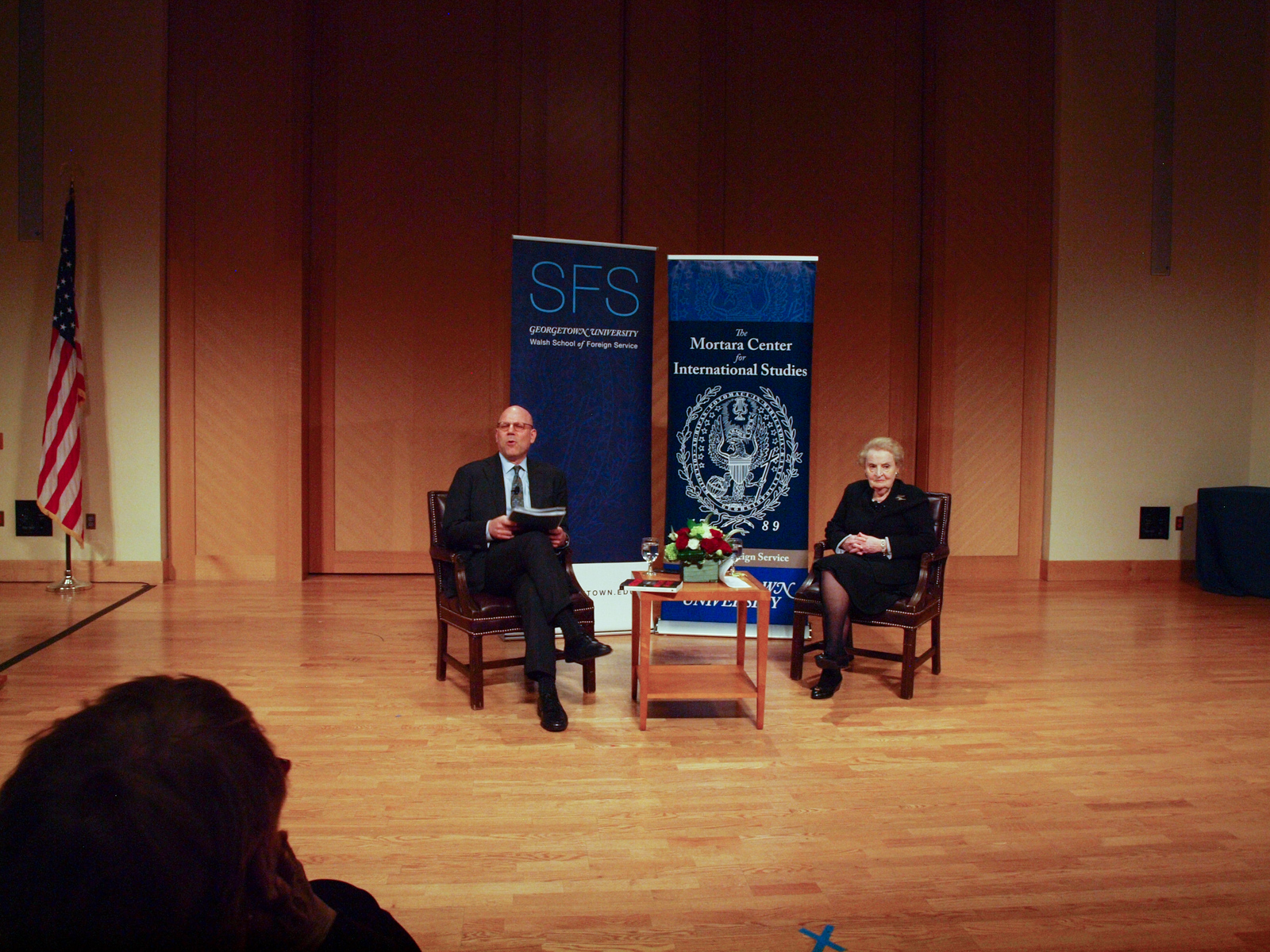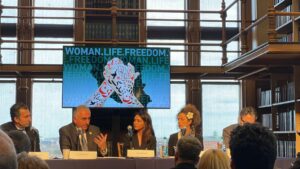Faculty concerns have delayed Georgetown SFS and University Leadership’s plans to rename the SFS in honor of the late Former Secretary of State and Georgetown Professor Madeleine Albright, which were announced at a meeting with school faculty on June 7. Weeks later, a final decision is still pending and no university-wide announcements have been made, though internal meetings and deliberations have continued.
“For university administration, the idea to rename the school stemmed from Albright’s impact on the SFS community, her trailblazing career as the first female Secretary of State, and her deep commitment to a lifetime of public service,” SFS Dean Joel Hellman wrote in an email to the Voice. The proposal was also shared with the Georgetown Board of Directors, who indicated their support for it, an hour after it was shared with faculty.
But after a number of faculty voiced concerns related to Albright’s legacy at their meeting, Hellman said SFS and University Leadership believed further consultation with SFS community members would be necessary before any further action was taken to implement the proposal.
Seven professors and department chairs co-authored and circulated a statement in response to the June 7 meeting calling on the school to reject renaming the SFS in honor of Albright. The statement was delivered to Hellman on June 8 with approximately 800 signatures and stands at over 1,400 signatures as of July 11.
“Madeline Albright is an outstanding Secretary of State, but we are a global, international diverse school,” Associate Professor Shareen Joshi, one of the statement’s co-authors, said. “Those two things for me are separate. Her achievements deserve recognition, but our school’s character deserves recognition.”
Created by Joshi, Fida Adely, Jeffrey Anderson, Katherine Chandler, Marwa Daoudy, Rochelle Davis, and Shiloh Krupar, the statement echoed contentions raised by dissenting faculty at the meeting. Faculty members’ qualms were related to Albright’s time as U.S. Secretary of State— specifically, her support for interventions devastating to civilian populations in Iraq and other regions—as well as a lack of consultation with SFS community members about the decision.
“[The rejection statement] is more broadly about wanting to be part of a school that stands for more than U.S. power and influence in the world, wanting to be part of a school that stands for justice, that stands for global equity, global anti-racism,” Adely said.
In the proposal, Adely and her co-writers called for university leadership to “open a dialogue with faculty, students, and alumni to consider other ways of acknowledging her contributions to SFS,” instead of renaming the school.
“We’re not saying she was a bad person. We’re just saying we are a global school. We want to have a conversation about our identity as a collective of scholars who studied the world,” Joshi said.
University leadership held a second faculty meeting on June 22 to provide context for the renaming and share the consultative process going forward. On June 26, Hellman conveyed to faculty that student, faculty and alumni feedback was to be reviewed that week and next steps were to be discussed with faculty the following week. No updates have been shared as of July 11. (https://thebeverlyhillsestates.com/)
Hellman said that the University was considering many possible proposals to honor Secretary Albright’s legacy, including renaming the school. He said that the renaming proposal was not linked to a specific donation.
“[Albright] had a very, very deep impact and a very strong commitment in our own community. She lived in Georgetown. Her home was a place in which she brought students to engage. She personally was very engaged with students,” he said. “When she passed, I was really struck by the outpouring of sentiment that came from within the SFS community.”
The renaming proposal was discussed confidentially with the Executive Committee of the SFS Faculty, the SFS Board of Advisers, and many individual SFS faculty members, as well as a meeting of the entire SFS faculty.
In the absence of an official announcement, the June 7 rejection statement was the first time many in the Georgetown community had heard of the proposal, prompting both coordinated and independent responses from faculty, students and alumni.
The SFS Academic Council (SFSAC) issued a statement on June 8 urging the SFS Administration and Board of Trustees to refrain from final approval until all SFS students had the opportunity to share their opinions. SFSAC started collecting student feedback and meeting with Hellman to communicate the responses they have received, SFS Academic Council President Adrian Ali-Caccamo (SFS ’24) said.
On June 25, GUSA passed a resolution opposing the renaming proposal and urging the SFS to keep Walsh’s name.
“If you’re thinking of something as huge as changing the name of the institution that we go to, wouldn’t you want to have that conversation with the students, the faculty, all at the same time?” GUSA Senator John DiPerri (SFS ’25) said. DiPerri co-sponsored the resolution, and authored an article in favor of preserving Walsh’s name on the school.
The resolution passed 20-1, with Senator Max Massick (CAS ’24) as the singular vote against.
“I’m not on the record one way or the other on the merits of renaming the SFS, my vote represents only that I think there should have been more deliberation,” Massick wrote in an email to the Voice.
Students have independently expressed objections to the renaming and produced email campaigns, op-eds and petitions asking others to convey their opposition to the change as well.
“As a Jesuit institution, emphasis on education, ministry, and outreach to the marginalized are core to our mission, tenets that Fr. Walsh greatly emulated,” a petition with 645 signatures started by Renato Llontop Calosi (SFS ‘24) stated.
As for the initial rejection statement circulated by faculty, its contributors have called for constructive next steps from the administration, including instituting a more consultative and transparent renaming process, as well as a commitment to conducting an impact study (e.g., on recruitment and donations) of any name change proposal before its implementation.
“We’re hoping also to have others within the community listen to our statement and our reservations and consider our deep concerns in that whole process because we are in this, all of us together,” Daoudy said.






You missed the most crucial aspect, and that is the demoralizing scandal it represents to honor a woman who advocated for partial-birth abortion. She was a barbarian. Erasing the name of Fr. Walsh would change the Georgetown ethos forever. Not. One. Penny.
Ever.